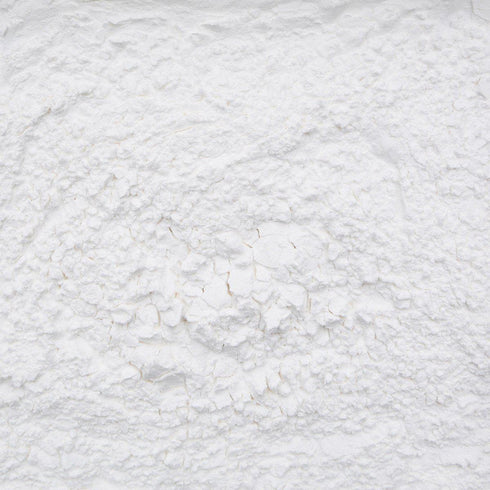- About Us
- FAQ
- Contact Us
- Track and manage my orders
- Wishlist
- 0Cart
- Order securely online, contact us by phone at 1-833-663-6637 or send us an Email

ORGANIC TAPIOCA, powder
SKU: B110-1
Hurry up! Sales Ends In
Botanical Name: Manihot esculenta
Origin: Thailand
Tapioca is a one of the purest forms of food starch and is a by-product of manioc flour production from cassava roots (aka yucca or manioc), the tubers of a woody shrub native to South America. The plant was carried by early explorers to most of the West Indies, Africa, and Asia and is now cultivated worldwide. It is one of the most drought-tolerant crops, capable of growing on low-nutrient soils, and is a major staple food throughout the developing world. After cassava plants are harvested, their roots are treated to remove naturally occurring toxins found in the plant. The starch is then processed into one of several popular forms: powder, flakes, sticks or ball-shaped "pearls" which are the most popular form and used to make tapioca pudding and bubble tea.
Qualities: Tapioca is mostly carbohydrate (1 cup of tapioca = 45% of daily carbohydrate requirement) and a rich source of dietary fiber yet naturally low in saturated fat, cholesterol and sodium. It is almost completely free of gluten and thus a common ingredient in many gluten-free manufactured foods, helping to improve texture and moisture. Furthermore, tapioca contains members of the vitamin B-complex, including pantothenic acid, folate, and B6, as well as iron, manganese, calcium, copper, and selenium.
Common use: Tapioca has a neutral flavor and strong gelling power, making it highly useable as a thickening agent in both sweet and savory foods. It is opaque prior to cooking but turns translucent upon hydration. Unlike Cornstarch, it can withstand a freeze thaw cycle without losing its gel structure or breaking down. Tapioca must be soaked and then boiled with a liquid to form a gel and is therefore usually added to food prior to cooking. For instance, to use it in a pie filling, mix it with the other ingredients, then let it sit for at least five minutes so that the tapioca can absorb some of the liquid.
The roots of the cassava plant, besides making tapioca, can also be found in the manufacturing of biodegradable plastic substitutes.
Substitute: Arrowroot powder has similar qualities and can be used as a substitute.
Storage: store in a cool, dark, dry place in well sealed container
Disclaimer: this information is for educational purposes only and has not been evaluated by the FDA or CFIA. It is not intended to diagnose, treat, cure, or prevent any disease. This product has been packaged in the same facility as peanuts, tree nuts, wheat, soy, and other potential allergens.
- Reviews
- Questions
Thank you for submitting a review!
Your input is very much appreciated. Share it with your friends so they can enjoy it too!
Organic tapioca flour
I bake gluten free bread for my daughter and her family, and tapioca flour is a key ingredient. By purchasing it in a larger quantity, keeping the bread organic is doable, and I feel less guilty about buying multiple smaller plastic bags of flour.
Tapioca Starch
Tapioca powder works great for using as a thickens in sauces and gravy, but you have to be careful not to make it too thick as it becomes stringy or globby...also works well to use instead of white flour in since recipes..
Quality Tapioca
High quality for a great price !
Perfect for Boba
Perfect for making my own boba. I just combine it with boiling water and some charcoal powder for colour until it gets smooth and pliable and stretch it thin so I can roll it into small balls. I cook the balls for 15 minutes and let them rest in cold water for a few moments. I then put them on a tray in the freezer and store them frozen. I take out what I want each time and reconstitute by letting it sit in boiling water for a few moments. Easy to make boba at home without getting premade ones with questionable ingredients.
